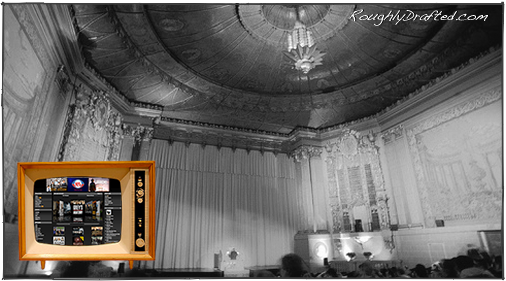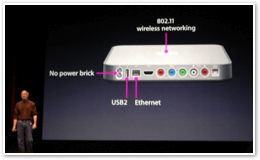
Five Ways Apple Will Change TV: 5
Okay, so you've already read Why Apple Will Change TV. Here's the last of Five Ways Apple Will Change Your TV.
Previous articles looked at how the iTV is positioned to add value to on-demand commercial content, users' own personal content, a variety of alternative content, and interactive content. What other kind of content is there?
#5: Original Content
For an encore, Apple will begin creating its own content, commissioning original programming by acting as a label and studio. Think I'm exaggerating or speculating beyond reason? Consider the following facts about:
-
•the music business
-
•the movie business
-
•the TV business
... where things are headed, and how Apple is involved. For each, I’ll show why Apple's involvement is far more significant than the mainstream media seems to understand.
Apple already has the market power to defy the RIAA and its greedy music exec members. Remember Edgar Bronfman Jr.? He's my second favorite bazillionare to poke fun at, perhaps only because he isn't also known to throw chairs.
Last year, he famously decreed that online music needed to be sold at 'variable prices,' so that new releases could be priced higher during their peak sales arc. He tried to spin this as market pricing, and emphasized the idea that on average, some old music might end up actually getting priced lower.
To anyone with an IQ above 60 however, his motives were pretty obvious: he wanted to choke all the golden eggs out of the magic goose of Apple's iTunes. Bronfman is good at choking the gold out of geese, having destroyed billions of his family's liquor legacy and then billions more in stupid business gaffes at the helm of Polygram and Universal.
Bronfman: the Music Industry’s Official Idiot
Steve Jobs had no problem outing Bronfman's short-sided greed, and refused to raise iTunes' prices. Jobs could do that because his iTunes Music store controlled enough of the market to tell billionaire playboy music moguls to pipe down; as revealed at Apple's Showtime event, iTunes now sells 88% of the legitimate Internet music downloads.
Of course, the vast majority of revenues from the 1.5 billion tracks sold in iTunes go to the music labels, who do all they can to cheat their signed artists out of an equitable share.
The music industry has long treated its performers like pimped out call girls, dressing them up, selling them out, and then giving only a very select few megastars anything to show for it.
Everyone in the industry knows that downloadable music is the future of sales. Since Apple controls the emerging online distribution channel in ways that no single retailer could, Apple is also in a position to rearrange how things work; the company has already started making changes.
Apple's iTunes created a marketplace and audience for the work of indie artists, who are unsigned or associated with groups such as the Portland, Oregon CD Baby. In 2004, CD Baby signed a deal with Apple to put all its artists interested in digital music distribution on iTunes.
Because Apple's iTunes doesn't require the huge budgets to promote and distribute physical media, it can offer artists the critical exposure, sales, and shelf space to allow them a fair shot at success without demanding they sign away excessive rights to all future profits.
Other labels require artists to sign unfair contracts to leverage their own investment risks in financing speculative blockbuster promotion deals.
In other words, iTunes makes music a business rather than a high stakes gamble. It removes a huge risk in speculative investment. Artists can earn what they are worth, rather than signing away all their future earnings in a risky crap shoot at fame.
To do that, artists will have to deal with Apple directly, or more likely, an affiliate system like CD Baby, or perhaps a new "iTunes Music" label. Apple has caused the owners of the Beatles' Apple Corps label enough grief in delivering computers that can play music; surely Apple won't incite further fury by creating Apple Records.
The Movie Business
If Steve Jobs' ability to change the music business was a surprise, his savvy in the movie industry shouldn't be. After leaving Apple in the mid 80's to pursue NeXT, Jobs bought the Computer Division of George Lucas' Lucasfilm for $5 million, and invested another $5 in developing the company into Pixar.

Six years later, Pixar made a $26 million deal with Disney to produce five CGI feature films. Those five films earned $2.5 billion. Disney bought Pixar this year for $7.4 billion, but not before a tumultuous period of contention between Jobs and Disney's former Chairman and CEO Michael Eisner.
Eisner: the Bronfman of Movies
Like Bronfman, Eisner was also born into wealth and even snaked through the entertainment industry along many of the same paths. Eisner was considered the protege of Barry Diller, but after being passed over as Diller's successor at Paramount, he went to Disney to help fix the ailing company.
Eisner managed to maintain a long term feud with Frank Wells, his co-chief at Disney, until Wells died in 1994; he then fought with Jeffrey Katzenberg over the appointment of Wells' post. Eisner ran Disney into the ground, prompting battles with Vice Chairman Roy Disney, who eventually resigned in frustration.
Eisner was so roundly disliked that he made history when an unprecedented 43% of Disney shareholders voted to oppose his reelection to the corporate board of directors in 2004. As shareholders' anti-Eisnerism increased, he was eventually forced to resign entirely.
It's no wonder that Eisner also fought with Jobs over Pixar. Eisner's Disney even pursued efforts to duplicate its own CGI group and abandon Pixar, but its top secret efforts to build its own production failed miserably.
Being intimately involved in Disney's skunkworks projects to clone its own Pixar, I witnessed firsthand how Eisner failed to build his own rival CGI group. Additionally, Disney was also thwarted at every turn by the embittered Jeffrey Katzenberg, whose rival studio DreamWorks did everything possible to shoot down Disney's films. More on that later!

Creating Original Content
With Eisner gone, Jobs and Disney's new CEO Bob Iger have famously joined forces. When Disney agreed to buy Pixar, Jobs insisted on leaving the animation studio in place with the Pixar name, and leaving Pixar's John Lasseter and Edwin Catmull in creative control.
If either Disney or Jobs were simply blinded by greed, Pixar would have ended up swallowed whole and replaced by a machine pumping out the same lackluster, visionless fluff programming that Eisner was pursuing as cost effective productions.
Instead, Jobs made certain that the artists that brought Pixar its success remained in place to create more of the same work. In contrast to Eisner's top down decree that all of Disney's animation move entirely to CGI, Catmull and Lasseter, while pioneers of CGI technology, have given Disney's directors more creative control and the freedom to use traditional animation techniques.
Just as NeXT infused a passion for new technology into the dying Apple of 1996, Pixar is infusing Disney with a creative renaissance ten years later. The common thread binds Disney to Apple as a source of content, but it also has created an open door to independent movie content.
The iTunes store not only has the power to bring new audiences to existing alternative content, but also stimulates and encourages the production of new alternative content. Of course, it actually already is, in the form of podcasting.
Apple is not only creating an audience for alternative journalists and entertainers, but also building the tools and delivering the training for an army of alternative content producers. But wait, how do small indie productions compare with $200 million movie budgets? Favorably! I'll explain why in a moment.
The TV Business
A year ago, when Mac rumor sites were buzzing about the potential for movies in the iTunes Music Store, Jobs said that movies simply weren't the most ideal content for the iPod or the iTunes store. Instead, he unexpectedly announced the availability of a small sample of TV shows.
That has since grown into hundreds of titles from forty networks. In retrospect, it was obvious that short format TV programming and video podcasts were a much more practical type of content to deliver over the web for playback on the iPod.
After learning from a year of experience in delivering millions of TV show sales and building a catalog of video podcast content, Apple increased its ability to serve movies, and announced the iTV as the eventual destination for them.
Movies require far higher bandwidth and much longer download times because movies demand a higher quality picture and sound than content designed for TV or podcasting.
Additionally, from a practical standpoint, the iPod isn't going to deliver a cinematic experience, even if it were upgraded to a significantly larger screen. The real place to watch movies is on a large screen, home theater system.
The Downloadable Movie Market
Realistically, there's no question that movies delivered by DVD or HD cable are going to look better than downloadable video. Apple calls its movie format 'near-DVD quality,' but isn't positioning it as the only way people will watch movies. Instead, it's an option, just as iTS songs are an option to buying full quality CDs.
Given Apple's existing portfolio of Disney content, the initial audience for the iTV and movie downloads will be parents with kids who want to watch the same movies repeatedly. Kids are notorious for scratching up DVDs, so the ability to watch movies from the iTV will mean the kids will wear out before the movie ever does.
The Death of Blockbuster Movies
But what about blockbuster entertainment that demands a big screen? Two camps are pushing for a new format to replace the DVD: Blu-ray and HD-DVD. Each offers far more storage and much higher video quality.
Will consumers replace all their equipment to move to the next DVD? Certainly some will, but for the majority of consumers, DVD works just fine.  Recall that home video was stuck with VHS for more than two decades, and that DVD spent around eight years overtaking VHS.
Recall that home video was stuck with VHS for more than two decades, and that DVD spent around eight years overtaking VHS.
 Recall that home video was stuck with VHS for more than two decades, and that DVD spent around eight years overtaking VHS.
Recall that home video was stuck with VHS for more than two decades, and that DVD spent around eight years overtaking VHS. Will consumers, who were happy enough with the fair to poor quality of VHS, suddenly abandon DVD within a few years to gain HD resolution that most people still don't have the capacity to even view?
HD is currently a high-end niche product; as bandwidth and compression technology advance, direct downloads may replace DVDs before HD media get the opportunity.
In any case, the supply of blockbuster theatrical movies is about to wane anyway: as the costs of delivering big budget movies spiral upward, studios face enormously higher risks in producing them. That’s going to change.
A $50 million movie that fails to break even is a bad deal, but as movies exceed $200 million budgets, the risks of failing to complete productions, or failing to compete for enough theater screens and moviegoers, quickly becomes an unattractive business.
As George Lucas explained to Variety this week: "We don't want to make movies. We're about to get into television. As far as Lucasfilm is concerned, we've moved away from the feature-film thing because it's too expensive and it's too risky."
Lucas said "the secret to the future is quantity," and compared a $200 million big-budget release movie with the production of 50-60 two-hour movies. "That's 120 hours as opposed to two hours. In the future market, that's where it's going to land, because it's going to be all pay-per-view and downloadable."
Variety's interview cited Lucas' discussions with Steve Jobs and John Lasseter, and describing further fundamental changes he saw coming to entertainment, in particular the death of cinema:
"I don't think anything’s going to be a habit anymore. I think people are going to be drawn to a certain medium in their leisure time and they're going to do it because there is a desire to do it at that particular moment in time. Everything is going to be a matter of choice. I think that's going to be a huge revolution in the industry."
Perhaps Lucas would agree the market for original content will challenge the market for blockbuster content and bring balance to the Force.
Original Content for TV
Either way, there's no way to ignore the market for creating original content targeted for TV. While ad supported TV is in decline, premium channels of paid content, including the original HBO as I cited previously, are moving from simply broadcasting movies toward producing their own series.
Some of the most highly acclaimed content on TV is the original programming produced by HBO, including the Sopranos, Six Feet Under, and Deadwood.
Additionally CNN recently reported that watchers of The Daily Show, an original content production of Comedy Central, knew more about election issues than people who regularly read newspapers or watch television news, citing results found by the National Annenberg Election Survey.
A lot of signs are pointing away from existing models of ad supported TV and big budget movies, and toward paid content produced directly for viewers. After building a differentiated source of on-demand, alternative content, is it even a surprise that Apple will soon start commissioning its own original content, and continue to expand its efforts to provide an audience to other sources of original content?
Next Articles:
This Series










Sunday, October 8, 2006








 Bookmark on Del.icio.us
Bookmark on Del.icio.us Discuss on Reddit
Discuss on Reddit Critically review on NewsTrust
Critically review on NewsTrust Forward to Friends
Forward to Friends
 Get RSS Feed
Get RSS Feed Download RSS Widget
Download RSS Widget





